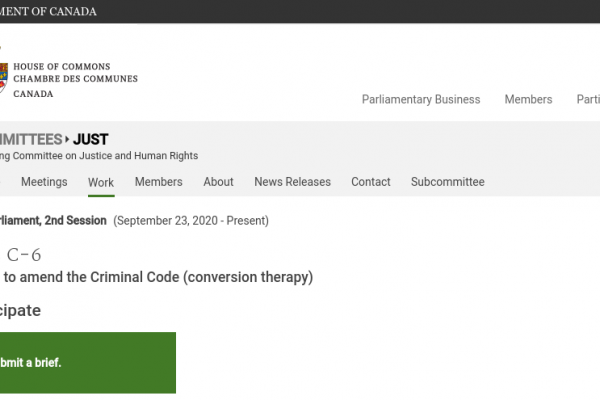The former Bill C-8 has been re-introduced in this new session of Parliament as Bill C-6 with no changes in wording. We sent the following letter to Justice Minister David Lametti expressing our concerns about this Bill.
Dear Minister Lametti,
This new session in Parliament gives you the opportunity to review proposed amendments to the Criminal Code to ban conversion therapy (the former Bill C-8).
Canadian Gender Report is a group of parents and professionals who are concerned about the medical treatment of children when they present to the healthcare system with a gender identity that is different from their birth sex. We believe that the parts of the Bill that deal with gender identity require reconsideration.
The effect of the bill will be to lock in a new and unproven “affirming” model of care which requires clinicians to accept without question a patient’s self-declared sense of gender identity and provide them with the medical transition that they desire.
We strongly support the need to treat all individuals with dignity and respect and condemn any practice that would coercively challenge important aspects of one’s personal identity. That said, young people who are embarking upon irreversible medical treatments that can lead to sterilization, lack of sexual function and pleasure, lifelong dependency on synthetic hormones, physical atrophy and other ongoing health issues need to be able to rely on competent healthcare providers who are able to address their highly complex and unique needs. Parents of these children need to be able to access the best care for their children and ask pertinent questions of these professionals without fear of criminal prosecution because they are not “affirming enough”.
The proposed legislation would restrict medical professionals from making competent decisions that fully respect the complexity of the individual and follow the most up to date evidence-based care. For example, research at the University of Toronto recently uncovered a link between autism and gender dysphoria. A significant number of children who adopt a gender identity that is different from their birth sex are also on the ASD spectrum. These children may benefit from screening and a developmentally appropriate model of care that takes their special needs into consideration. Canadian Gender Report will be bringing forward testimony from a family of a teenaged girl who was “affirmed” and given the green light to start cross-sex hormones prior to any screening for autism. Through a series of lucky events, the supportive family postponed cross-sex hormones and their daughter eventually received a diagnosis of autism. She later abandoned her belief that she was a boy and is now doing very well and embarking on an exciting career.
Many professionals throughout the world continue to question the affirming approach. They believe that it prevents them from fully exploring the range of a patient’s circumstances and puts pressure on clinicians to approve requests for hormone and surgical treatment rather than helping the patient to understand the causes of their distress and the most appropriate means to manage it.
In fact, the UK National Health Service revised a public statement on its website just months ago. The previous statement that “effects of treatment with GnRH analogues (puberty blockers) are considered to be fully reversible” was revised to a much more cautious and evidence-based perspective that “…in many cases gender variant behaviour or feelings disappear as children reach puberty.” and “Little is known about the long-term side effects of hormone or puberty blockers in children with gender dysphoria.”
The updated and evidence-based UK NHS guidance directly contradicts statements in Bill C-8 that one’s gender identity cannot change and that there should be an exemption in the conversion therapy legislation to allow for services related to medical transition.
There are currently three reviews of the standards of care for treatment of gender dysphoria going on in the United Kingdom:
- An independent review by the National Health Service of the use of puberty suppressants and cross sex hormones;
- An independent review by The National Institute for Health and Care Excellence of the latest clinical evidence; and
- A lawsuit (judicial review) of the capacity of children to consent to the use of hormone blockers.
Sweden is also conducting a review of treatment standards for gender dysphoria.
It is also important to note that media coverage on transgender issues is very one-sided and contributes to a significant amount of misinformation concerning the benefits of gender affirming surgeries and medical transition in general. Last year, researchers in Sweden published a study of their countries’ data which purported to demonstrate that gender affirming surgery resulted in lower utilization of mental health services.
This study was widely reported in the mass media as providing the first really objective proof that gender affirming surgery provided long term mental health benefits. The study received much criticism, however, for numerous shortcomings. Re-analysis of the data led to an entirely different conclusion – that there was no evidence of improved mental health outcomes for patients who had received gender affirming surgeries. This correction has not been widely reported.
Children and adolescents are being asked to give informed consent to these treatments well before they have reached the level of cognitive maturity required for this type of decision. Informed consent requires that the patient understand the risks of transition and available alternatives. We believe the proposed legislation would further interfere with the ability to provide informed consent as clinicians would be unwilling to discuss alternative treatment options (including open-ended and developmentally appropriate therapy) and may not be able to access objective evidence-based research to fully disclose the risks of medical transition.
Further, it is clear that the government has consulted with transgender advocacy groups, but these groups do not represent the full range of interests that need to be considered. Transgender advocacy groups, by their nature, speak for people who have undergone gender transition and are satisfied with their decision. There are at least two other groups who need to be considered.
First, there are a large number of people who experienced gender dysphoria as children but desisted after the onset of puberty. This group of people are largely invisible because they get on with their lives and have no further interest in gender issues.
Second, there is a growing group of de-transitioners who did undergo social and medical transition but regretted their decision. This group is becoming increasingly vocal as many of them were harmed by an affirmative care model with recommended hormones and surgery rather than treating underlying mental health issues. A UK based detransitioner has brought a lawsuit against the UK NHS for being negligent in her care. Her gender identity was unquestioningly affirmed and she underwent cross-sex hormone therapy and a double mastectomy. Her story is not unlike many we are starting to hear about in Canada.
A large number of desisters and de-transitioners are lesbian or gay. There is growing concern in the lesbian and gay community that affirmative care for gender dysphoria is really a new form of conversion therapy which encourages young lesbians and gays to escape the stigma that still attaches to same sex attraction by identifying as the opposite sex.
It is also alarming that the explosive growth in the numbers of youth seeking gender transition is coming from young females. This trend contradicts all previous evidence on the treatment of gender dysphoria as boys used to outnumber girls 3:1. This ratio is now more than reversed, and new research is uncovering the effects of social media and peer pressure on girls as they enter the often volatile phase of puberty and naturally explore their identity as they seek validation and security.
Children and young people experiencing distress and requesting medical transition are vulnerable and deserve the highest quality of care and compassion. Criminalizing alternatives to medical transition such as open-ended and developmentally appropriate therapy options will eliminate valid options and reduce the quality of available transgender healthcare options.
Canadian Gender Report is working on a detailed brief in response to the Bill which provides backup to the information in this letter. We would be pleased to share it with you and your team.





Excellent letter, thank you. Can you create another template for how to write to our individual MPs? That would be much appreciated.
Sure! Thanks for the suggestion.
Our template letter went out to our email subscribers this morning.
Thank you this was well said.
Excellent letter! I would like a link to the new Bill if you have it available. Thanks
The text of the Bill can be found at https://parl.ca/DocumentViewer/en/43-2/bill/C-6/first-reading
Excellent letter.
Hi there,
I have subscribed to your page. Can I get a template of how to write to my MP?
Renee
Yes, we’ll email an updated one out this week!